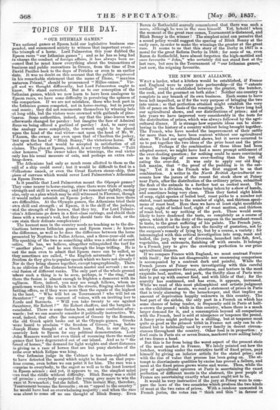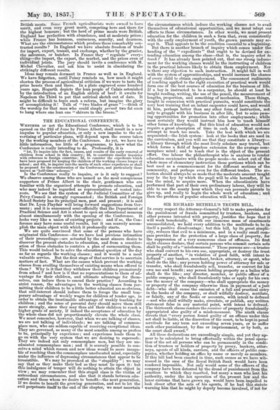THE NEW HOLY ALLIANCE.
WHAT a larder, what a kitchen would be established, if France and England were to enter into partnership—if the "entente cordiale " could be established between the grazier, the butcher,
the cook, and the gourmet on both sides ! Neither one country is complete in any branch of its own business. Each seems to have been left imperfect, as if for the very purpose of bringing the two into union ; BO that perfection attained might establish the very life of peace on the basis of the roasting-jack. We have long had our agricultural shows, and our distributions of prizes; and of late years we have improved very considerably in the testa for
the distribution of prizes, which was always followed by the agri
cultural dinner. It is strange how separateideas can be slumbering in the history of a country without being brought together. The French, who have needed the improvement of their cattle far more than we, have been content without our agricultural
show. We had our agricultural shows, but it never occurred to us to put together the two ideas of the prize beast and the prize dinner. Perhaps if the combination of these ideas had been
adopted sooner, we might have had a more prompt settlement of the over-feeding question ; for nothing could be more convincing as to the impoliey of coarse over-feeding than the test of eating the over-fed. It was only to apply our old English maxim, that "the proof of the pudding is in the eating." Yet it is the French who first suggest to us that combination. A writer in the North British Agriculturist recounts how the jurors of the recent fat stock show at Poissy near Paris, after the distribution of the ordinary prizes, submitted the flesh of the animals to a further test as cooked meat. The jury came to a division, the votes being taken by a show of hands, and sometimes being very close. Thus they tasted eight kinds of soup, eight species of boiled beef, roast perks to a number not stated, roast muttons to the number of eight, and thirteen. 'mens of roast beef. Here then we have at least eight mouthfuls of soup, eight of boiled beef, eight of roast mutton, and thirteen of roast beef, to say nothing of the pork. These would seem likely to have deadened the taste, as completely as a course of spices, which it is the dutyof the surgeon in the merchant-vessel to taste, to the great suffering of his palate. The French jury, however, contrived to keep alive the faculty of gustation, not by the surgeon's remedy of lying by, but by a course, a variety ; for intermingled with this critical investigation into soup, roast and boiled, the jury, by way of diversion, launched into fish, fowl, vegetables, and entremets, finishing off with sweets. It belongs to a French jury to give the crowning perfection to our prize agricultural dinners.
If we compare France with England, we must contrast France with itself; for this not disagreeable nor unamnsing comparison is accompanied by a contrast dark and painful. While the French jurors at Poissy were investigating with this careful nicety the comparative flavour, shortness and texture in the most
exquisite beef, mutton, and pork, the shortness, class of Paris were fain to put up with coarser food, and with little of that; for the scarcity has continued, and has even, it appears, increased. While we read of this most philosophical and artistic judgment on the exhibition of meats, we read a statement of prices in Paris that is truly alarming to the housekeeper, and that implies an amount of deprivation happily unknown in this country. The best part of the sirloin e only part in a French ox which has some chance of being ie thnder, is frequently sold in Paris at halfa-crown the pound ; while in this country, where there is a much larger demand for it, and a consumption beyond all comparison with the French, beef is sold at ninepenee or tenpence the pound. A fancy price might perhaps be a shilling, but at tenpence meat quite as good as the primest titbit in France not only can be obtained but is habitually used by every family in decent circumstances throughout the country. Other food is in proportion: a
fowl costs in Paris six or seven francs, mackerel were g lately at two francs a head.
But this is far from being the worst aspect of the present state
of the meat market in France. We lately pointed out how the butcher, working under the restrictive tariff of fixed prices, pays himself by giving an inferior article for the stated price ; and with the rise of value that process has been going on. The attempt to discriminate qualities by excise has proved a failure and meat at the fixed prices grows worse and worse. Thus, while the jury of agricultural epicures at Paris is ascertaining the exact perfection of different meats in the abstract, the poor people of France are ascertaining exactly what meat ought not to be.
It would be very instructive if the jury at Poissy were to compare the laws of the two countries which produce the two kinds of meat at the two rates of prices. With a candour unwonted in French juries, the votes ran " thick and thin" in favour of British meats. Some French agriculturists were owned to have merit, and even very great merit, competing here and there for the highest honours ; but the herd of prime meats were British. England has perfection with abundance, and at moderate prices; while France has leanness, coarseness, scarcity, and dearness. What are the circumstances which produce these remarkably contrasted results ? In England we have absolute freedom of trade for import, export, transit, and exchange, whether by the grazier, the salesman, or butcher. In France they " regulate " everything—the import, the export, the market, and the prices even of individual joints. The jury should invite a conference with M. Michel Chevalier, and ask him to assist in elucidating the strikingly different results. Ideas may remain dormant in France as well as in England. We have forgotten, until Poissy reminds us, how muoh it might shorten the process of agricultural criticism if we were to taste the prize beasts then and there. In a plate engraved sonic hundred years ago, Hogarth depicts the lean people of Calais astonished by the introduction of an English sirloin of beef: it awaits for Napoleon the Third to put that satirical sketch out of date. It might be difficult to begin such a reform, but imagine the glory of accomplishing it Talk of "two blades of grass" /—think of the worship for that man who could simply permit two fat oxen to hang where one lean one "shivers in the breeze."



























 Previous page
Previous page